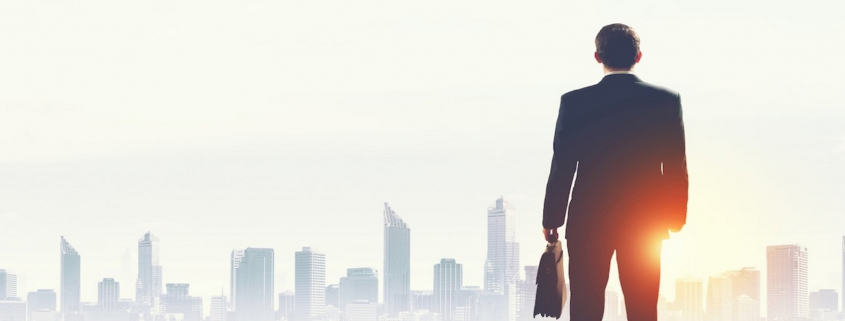As several hundred business leaders gathered for the Greater Miami Chamber of Commerce’s Goals Conference, the typical celebratory mood was tempered in the aftermath of the mass killings in Orlando.
But the resolve to dig in and tackle some of the region’s most critical issues seemed to have strengthened. For this conference, it was more about looking ahead than looking back, and accelerating an innovation economy, bridging the economic divide, solving the traffic nightmares and confronting sea level rise with a smart strategy were all issues on the table, as well as the talk of the hallways and lounges at the chamber’s annual two-day planning retreat. Cuba and cyber-security were also discussed as the event opened last Thursday at the Hilton Miami Downtown.

FIU President Mark Rosenberg assumed the chairmanship of the Greater Miami Chamber of Commerce on Thursday. Florida International University
A sense of urgency was highlighted in remarks by incoming Chamber Chairman Mark Rosenberg, Florida International University’s president, and a new economic report by the FIU-Miami-Creative Initiative.
“Miami has a window of opportunity to capitalize on its economic strengths,” said Richard Florida, director of the Martin Prosperity Institute at the University of Toronto and Visiting Fellow of the FIU-Miami Creative City Initiative. “We can’t be left behind … let’s get it done,” Rosenberg said.
Much of the talk was about the need for region-wide cooperation and solutions involving businesses, chambers, governments and economic development organizations across South Florida. Indeed, in a surprising sign of regional cooperation, the GMCC and Fort Lauderdale Chamber announced in April they are exploring a merger. “It would be a one plus one equals three,” said outgoing Chamber Chairman Christine Barney.
On accelerating the startup community, Florida said the Miami region starts from a good place, with a culturally rich, urban, diverse lifestyle and environment that help facilitate “collisions” – spontaneous meetings of the minds – that accelerate innovation. Another asset: A creative class of tech, arts, media, academia and other professionals that is more than 700,000 people strong. It’s also No. 2 in the nation in an index that ranks areas based on tolerance and openness, Florida said. But recent reports have highlighted that Miami’s startups aren’t scaling up. [Read the new Creative Class Group-FIU study here.]
“What we really need to do is go from quantity to quality,” he said.
Panelists — Xavier Gonzalez of eMerge Americas, Rebekah Monson of The New Tropic and Melissa Krinzman of Krillion Ventures, had several suggestions, all involving the chamber, with 4,100 members employing more than 400,000. Noting that the startup community was ill-represented in the ballroom, find more ways to connect the two groups, said Gonzalez. The Chamber’s members can be the ultimate user group for startups needing to test their concepts in the business community, said Krinzman.
“The established business community can really help the startup community level up,” said Monson.
Startups thrive on wrapping their heads around big problems, Monson said, and there was a monstrous one discussed in the afternoon panel: Sea level rise. In fact, some of the panelists there said they need the startup and millennial communities to get involved.
Susanne Torriente, Chief Resiliency Officer of the city of Miami Beach, said the fact that Miami was chosen as one of the Rockerfeller Foundation’s 100 Resilient Cities presents an opportunity for Miami to take the lead in this, and urged government and business groups to come together rather than everyone working in silos.
“This is an incredible opportunity for creating one strategy for the whole region,” said Torriente.
Other ideas offered by the panelists, who included Steven Davis of the Everglades Foundation, developer Andrew Frey, Buck Martinez of FPL and Tiffany Troxler, a research scientist at FIU: Build a set of best practices for businesses, with a priority agenda that can be an action plan; increase awareness through exhibits, conferences, messaging and think tanks; and increase the density allowed on appropriate transit-friendly urban areas in order to take pressure off the suburbs and the Everglades.
The conference continues Friday with a session of mayors, another one addressing transportation and a closing luncheon with the theme “Pivot to Asia.” [See the Chamber’s goals around these issues here]
“We have the power to make an impact,” said attorney Marlon Hill, addressing the luncheon crowd after receiving a leadership award along with nine other business leaders. “Just go out there and get it done.”
Honoring Miami’s Leaders
A number of business leaders received awards at the Greater Miami Chamber of Commerce Goals Conference, including:
Adrienne Arsht, M. Athalie Range Miami Pioneer for Progress Award
The Honorable Steve Leifman, Henry M. Flagler Community Award
Dwight Hill, Banking/Finance Award
Nelly Rubio, Entrepreneurial/Professional Award
Jeannett Slesnick, Government Award
Daniel “Dan” Jacobson, Legal/Law Award
Jose Cela, Nonprofit/Cultural Award
Marlon A. Hill, Bill Colson Award
Dr. Michael Alessandri, Visionary Leader of the Year
Alexandra (Alex) Villoch, Power Leader of the Year
Source: Miami Herald

